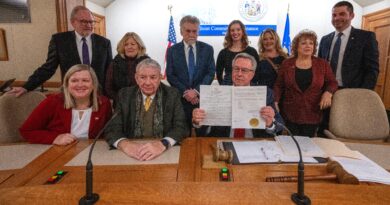‘Birth of Conspiracy’: Local elections official spawns viral conspiracy about Nashville bomb
In the wake of the Christmas Day bombing in Nashville, an area attorney sparked a false and viral conspiracy theory, suggesting a connection between the attack and election security.
Mid-afternoon on Christmas — hours after an explosion damaged dozens of structures in downtown Nashville, downing AT&T service including 9-1-1 access across the region, injuring three people and leaving others displaced by the wreckage — a Ringgold, Georgia, attorney got on Facebook to make a joke.
(READ MORE: Bomber to neighbor: The world is ‘never going to forget me’)
Jeremy Jones, an attorney, poll watcher, absentee review panel member and vice president of the Catoosa County Republican Party, posted a false claim to social media, claiming that voting equipment was being shipped to AT&T in Nashville prior to the explosion.
“Because it is 2020, I immediately thought to myself, ‘I wonder if this will be claimed to be a conspiracy related to the COVID vaccine, the election, or something new,’” he wrote in an email to the Times Free Press, titled “Birth of a Conspiracy,” in which he claims his misinformation was a social experiment meant to combat false information.
“Being very active in the election process, I have tried to quell some of the more outlandish claims I have read. I will often illustrate the absurd with the absurd,” he continued.
In an alleged “gag,” Jones edited an innocuous Facebook post about Apple auto-correct, originally dated Dec. 20, five days before the attack, to allege that AT&T — which was damaged and potentially targeted in the bombing — had been contracted to audit election equipment.

“Rumor is that AT&T got the contract to do the forensic audit on the Dominion machines. Many are being transported to the Nashville location this week. ..” the edit made around 2 p.m. on Christmas Day reads.
Jones was referring to Dominion election equipment that has come under scrutiny after President Trump and others claimed the company deleted millions of votes. Some Trump supporters have claimed Dominion machines flipped votes from Trump to Biden, but federal officials have said that did not happen and the election was secure. Officials in Georgia, a swing state that used Dominion machines and in which Trump has claimed election fraud, also said the machines were secure.
Though viewers of the post can find the edit history through a drop-down menu on the post, the edit makes it appear that this Dominion insight was published five days before the attack, rather than its actual publication time. Then Jones shared a screenshot of the edit with the caption “Coincidence? ..”
The screenshot of the post rapidly made its rounds on Facebook and Twitter, accruing thousands of shares in a matter of hours, though there were no previous tweets about Dominion and AT&T prior to Jones’ post.
“My intent was not to spread fake news but is to make fun of my conspiracy-minded friends,” Jones said Wednesday, noting that he’s done similar things with posts about COVID-19, spoiled Georgia ballots and other hot-button news topics.
“The only other one that got a little bit of traction was for a different reason back in April. I made an April Fool’s post because this is when COVID was still early. And I said that the Catoosa County school system had decided to just cancel school for the rest of the year and I made up a bunch of other stuff, a lot of which ended up becoming true,” he said of a post which he removed at the request of the school district. “I won’t do it anymore because my friends on Facebook know the type of humor that I have, but this is the first time that a friend of a friend took my post and took it seriously and put it out there I didn’t have control over it.”
According to Jones, the odd punctuation — a period followed by a space and two more dots — was meant to signal to his friends that the since-hidden but once public post was a joke.
Lisa Fazio, a researcher and assistant professor at Vanderbilt University who studies misinformation, said Jones’ post may have been a joke, but it had the effect of any other false information.
“I think it’s extremely irresponsible to post something like that without it being clearly labeled as some sort of social experiment or whatever he is claiming,” Fazio said Wednesday. “Most people who see information like that, particularly coming from someone who’s supposed to have some expertise — like a lawyer or someone who’s on this senator’s committee — they’re gonna expect that that’s true.”
“And especially in breaking news events where it’s so difficult to get confirmation, about a lot of these rumors. You can see this misinformation spread really quickly, really easily,” she added.

Sen. Jeff Mullis, R-Chickamauga, who formed the absentee committee in December to combat the “egregious attempted election theft by radical socialists on Nov. 5,” said he was unaware of Jones’ post or history of misinformation.
“I don’t think misinformation is good, regardless if it’s intentional or non intentional or whatever,” he said Wednesday. “Part of the problem that we have with suspicion of fraudulent voting is the rumor mill, or Facebook or, please excuse me, fake news, whether it’s social or not social.”
“I’m not aware of any of Mr. Jones’ comments but I am not for misinformation, not for spreading any untrue, intentionally untrue, information,” he added, noting that he hopes his committee will help restore faith in the electoral process.
But, according to Fazio, once misinformation has spread, the damage is done.
“We know that kind of corrections and debunks never reach as many people as the original viral misinformation,” she said of the claim, which has been refuted by Snopes, the Associated Press and others. “So both you’ve got the problem that a lot of people who saw the original posts won’t see any sort of correction. And then you’ll also have the problem that it’s much harder to convince people that something they read is wrong, as opposed to kind of them never being exposed to the false information.”
Fazio also said this kind of misinformation can lead to more tangible reactions to conspiracy theories.
“You always see a lot of misinformation following big breaking news events like this, especially an event like the Nashville bombing where it’s going to be weeks or months of investigation before we get firm answers. That tends to be a space that’s really ripe for misinformation,” she said of the bombing where the motive is still unconfirmed, but state and federal investigators believe the suspect’s own belief in conspiracy theories may have played a role.
“So it hasn’t been confirmed yet, but since the bombing may have been motivated because of his own belief in different conspiracy theories or misinformation, that could be a form of real outcomes you can see come from the fact that a lot of people believe in these conspiracy theories and other false beliefs.”
To avoid misinformation, Fazio said readers should rely on trustworthy news outlets rather than social media, especially as breaking news unfolds.
“One of the key things is to remember that in the first days, there’s going to be false information. And just be prepared that some of what you see may turn out to be wrong,” she said, encouraging skepticism of what even reliable people post on social media in the frenzy of a breaking news event. It’s safer to rely on news reports, especially printed articles or articles posted online, rather than tweets and Facebook posts.”
Meanwhile, Jones, who is yet to publicly denounce his false Facebook post, maintains he didn’t mean to spread misinformation.
“My intent was not to start a rumor,” Joneshe said. “My intent was to goof off with my friends on Facebook, and just poke fun at conspiracy people.”
Contact Sarah Grace Taylor at staylor@timesfreepress.com or 423-757-6416. Follow her on Twitter @_sarahgtaylor.
*** This article has been archived for your research. The original version from Chattanooga Times Free Press can be found here ***


